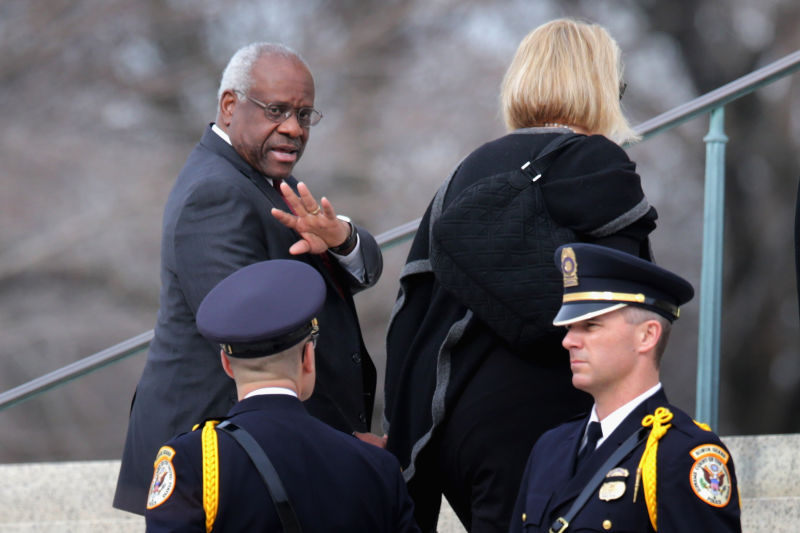"Ms. Eisenstein, one question," Thomas said. He then zeroed in on the government's position that those convicted of misdemeanor domestic violence should be prohibited from possessing guns.
"Can you give me -- this is a misdemeanor violation. It suspends a constitutional right. Can you give me another area where a misdemeanor violation suspends a constitutional right?"
Eisenstein could not cite such an example, and Thomas was off and running, questioning the notion that a misdemeanor offense could lead to the lifetime loss of a right guaranteed in the Constitution.
He spoke 11 times in all, raising his utterances per year average from zero to 1 -- this being the 11th session of the Supreme Court since he last spoke during arguments. (The full transcript of the Voisine arguments is embedded below.)
Here's more on the context of Monday's session from Sam Hananel of The Associated Press.
Until [Thomas spoke], it had been business as usual for the first 50 minutes of the hourlong session in Voisine v. United States. The court was considering the reach of a federal law that bans people convicted of domestic violence from owning guns.
None of the other justices visibly reacted to Thomas' remarks.
Eisenstein noted that violating other laws can, in some cases, limit a person's free-speech rights under the First Amendment.
"OK," Thomas said. "So can you think of a First Amendment suspension or a suspension of a First Amendment right that is permanent?"
It was a topic no other justice had asked about. And his comments came after several of the other justices seemed to favor the government's position that the law applies whether the abuse is intentional or reckless.
Thomas last asked a question in court on Feb. 22, 2006, and his unusual silence over the years has become a curiosity. Every other justice regularly poses questions from the bench.
Thomas has come under criticism for his silence from some who say he is neglecting his duties as a justice. He has said he relies on the written briefs in a case and doesn't need to ask questions of the lawyers appearing in court.
Carrie Severino, a former clerk to Thomas who now heads a conservative advocacy group, said the justice had kept his silence "because he felt that oral arguments have become less civil and respectful of the attorneys and their arguments over the past two decades, often becoming little more than rhetorical jousting among the justices."
Like Scalia, Thomas has long championed Second Amendment gun rights. In December, he and Scalia objected when the high court refused to hear a challenge to a Chicago suburb's assault weapons ban that was upheld by lower courts. Thomas said the justices should not stand by while lower courts relegate "the Second Amendment to a second-class right."
